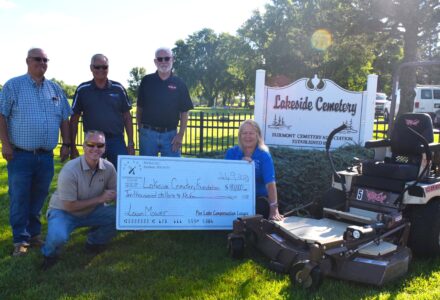Finstad visits Harsco Rail

From Left: Bo Phillips, Congressman Brad Finstad, Ed Young and David Dunlap look at equipment Thursday afternoon at Harsco Rail in Fairmont. In addition to touring the facility, Finstad spent time hearing from employees and talking about policy.
FAIRMONT– On Thursday Congressman Brad Finstad visited Harsco Rail in Fairmont to tour the facility, meet with and hear from employees and talk about policy.
Finstad represents Minnesota’s first congressional district, which covers a large portion of southern Minnesota, including Martin County. He was elected in a special 2022 election to finish the term of the late Jim Hagedorn. He was then elected into the position at the Nov. 8 general election.
At the start of the visit on Thursday, Finstad introduced himself, sharing that both he and his wife come from farm families and that the couple, along with their seven children, farms corn and soybeans and owns a soil laboratory in New Ulm.
“It’s an honor to serve southern Minnesota. There’s 21 counties in the congressional district from Wisconsin to South Dakota. It’s the whole I-90 corridor and pretty split between about half rural and agriculture and and the other half an urban/rural setting with Mayo Clinic in Rochester, Mankato, Winona and communities like that. It’s an awesome district. A lot of miles. A lot of rail miles,” Finstad said.
David Dunlap, Vice President, Global Government Relations at Enviri, Harsco’s parent company, noted that many people don’t understand what it takes to keep the railroads running.
“There’s a lot of stuff that happens behind the scenes,” Dunlap said.
Finstad asked about the history of the company and why it has a location in Fairmont. It was shared that the Fairmont location opened in 1909 and in 1923 adopted the name Fairmont Railway Motors. It had been booming though it downsized about a dozen years ago, soon after the location’s 100th anniversary.
At a time Fairmont Railway Motors employed hundreds of people and was the second leading employer behind Mayo Clinic in Fairmont.
Now, the Fairmont location employs about 40. However, on Thursday Bo Phillips, Director of Harsco Rail in Fairmont, said they hope to hire another 10 to 20 employees, as the industry has picked back up and there’s more demand for product.
“As Bo noted, from Australia to India to China to the UK, all over Europe and all over the U.S., we make these machines and sell them to folks so they can maintain the lines,” Dunlap said.
Switching to policy discussion, Dunlap brought up the East Liverpool, Ohio trail derailment, which happened earlier this year.
“The Senate put out the Rail Safety Act… that’s something we’re very interested in because it’s very focused on, in this case the East Liverpool train derailed because of an over-heated bearing, the wheel fell off,” Dunlap said.
He said that in reality there are hundreds of small derailments a year which result in no injuries or fires or spills.
“It’s not that the wheels fall off. It’s not necessarily the maintenance of the cars themselves but the maintenance of the tracks,” Dunlap said.
While he likes that the Rail Safety Act focuses on safety, he pointed out that it only focuses on certain aspects of safety and said he would like to see it broaden up and focus more on the need to maintain the rails.
“There’s no doubt about it, infrastructure in itself is a hot topic. There’s conversations we need to have about how long anyone with common sense realistically expects some of these systems to sustain themselves,” Finstad said.
He said he understood that there was some hesitation on the House side regarding the Rail Safety Act, but that he thought now could be an opportunity for some good conversations to take place.
“We just want to make sure it’s on your radar if it shows up in the House,” Dunlap said.
Adding on to the topic of infrastructure, Dunlap asked Finstad what his thoughts were regarding the Infrastructure Investment and Jobs Act (IIJA), which was passed before Finstad took on his current role.
“As I look at some of these issues moving forward, I try to take the southern Minnesota common sense approach of what’s reality in regards to what we need done, how are we going to pay for it and are we going to put so many loops in that we’re our own enemy in some of these things,” Finstad said.
He said he believes that congress needs to do a better job of making sure that there aren’t too many restrictions and regulations.
“When you start talking about the regulations, our concern is that it will never trickle down because the bureaucracy will suck all the money up before it goes to asphalt, rail or concrete and we spent all of our money filing a permit,” Dunlap said.
A question was then posed to Finstad whether other businesses have seen any positive impacts yet. Finstad said he’s heard similar comments about regulation concerns from other businesses that he’s talked to.
“What worries me is a little gets into state politics, too. We just toured a plant that spent $450 million in new plants in South Dakota and not Minnesota. In the last month I’ve heard that play out four or five times,” Finstad said.
He added that from a federal perspective he believes a lot of great things can be done, but if it comes back to a state climate that can’t deploy the funds or programs, it creates a winners and losers mentality on where the actual money ends up.
Bringing the conversation back to railways, Finstad said, “when I give tours of the Capitol, the first thing I say is ‘we need to remember that this country was built on agriculture, mining, rail and manufacturing.'”
He said the question is whether the country is going to continue to honor that heritage and continue to focus on what it’s dong for the next generation of Americans to make sure that it’s left with strong rails, strong roads and strong infrastructure.
Representative Bjorn Olson was also present and, as a member of the Transportation committee, he shared that they have yet to received any money from the IIJA yet but that they’ve allocated almost $300 million for when that money is released.
“But I really appreciate the conversation on rail safety. There was a big discussion in the committee one day about rail safety and the union,” Olson said.
Dunlap said some thought has to be put into it. He pointed out that more rail can’t be put in right away, but that it’s a matter of maintaining what they already have, which is needed for a number of reasons, including safety.
“There’s still 20 to 30 roadway workers killed a year, not counting the at-grade crossing accidents or trespassers,” Dunlap said.
Finstad said that this was an example of when politics and policy becomes real.
“Obviously what we do affects you guys. I’m not going to pretend I know what goes on
in these walls, but the opportunity for us to be here and listen and learn and better understand how we can help is what these visits have been about,” Finstad said.
In addition to visiting Harsco Rail on Thursday, Finstad also had visits in fairmont with the American Legion, 3M and CHS


